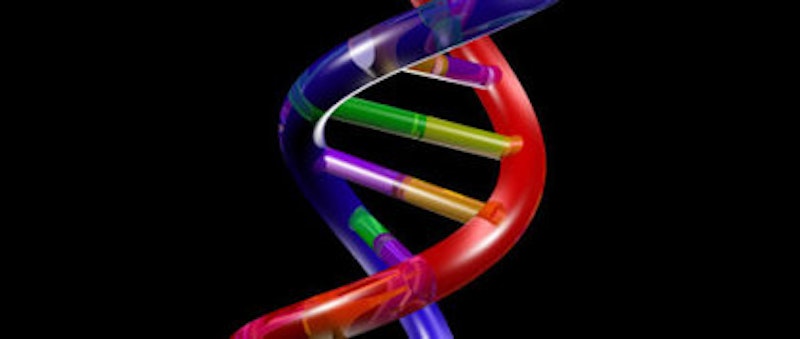Sexuality isn't something you choose; you're born with it. That's broadly been the position of the gay rights movement, and for good reason. If homosexuality is a choice, then at least some people are going to condemn that choice as evil. If homosexuality isn't a choice, but a biological fact, then laws against it are as arbitrary and cruel as laws against left-handedness or being short.
This explains the outcry against Brandon Ambrosino's article last month in The New Republic in which he argued that for him being gay wasn't a biological necessity, but a choice. That outcry was taken up again last week upon the news that Ambrosino has been hired at Ezra Klein's new journalism venture Vox.
In his response to Ambrosino, Mark Joseph Stern argued that the science is set and done; we know for sure that being gay is not a choice. It is "clearly, undoubtedly, inarguably an inborn trait" he says. But when you look at the rest of his post, that "clearly, inarguably" starts to look a lot less clear. He admits that innate sexuality is only the case in men; female sexuality appears to be more fluid. Even in men, he notes, there doesn't appear to be any single biological cause; the best he can do is insist that many biologists think that fraternal birth order effect accounts for the orientation of 15 to 30 percent of gay men. Stern says that researchers mostly agree that homosexuality is biological—but it's worth remembering that for many years, it was believed that homosexuality was a disorder or a mental illness. Prejudice and preconceptions affect scientists as much as they affect other people, and in an area where the research is so uncertain and causation so difficult to pinpoint, it’s important not to run out ahead of the evidence. (As Ambrosino himself argues in his response to Stern). But rather than giving the benefit of the doubt, Stern declares that Ambrosino is deliberately choosing "to give anti-gay conservatives a weapon to wield against gay rights activists." Ambrosino's sexuality can't be true; therefore he is evil. Doesn't that sound, in the context of the homosexual experience, depressingly familiar?
In fact, there are many instances in which sexuality can have an element of choice. I spoke to one gay man, for example, who described himself as "homosexual with strong heterosexual tendencies." Some people might have classified him as bisexual, but he'd made a political decision, based on his commitment to the gay rights' movement, to identify specifically as homosexual. For that matter, I had a passing semi-crush on Keanu Reeves at one point, but I've never identified as bisexual. In her book Between Women, Sharon Marcus argued that in Victorian England same-sex attraction between women was normal and encouraged as part of a heterosexual identity, and there are many instances where homosexual desire and attraction are an acceptable part of a heterosexual male identity too. Even if you accept that desire is entirely biological, what that desire means, and how it gets interpreted as identity, is hugely influenced by culture and by how people relate to that culture.
In her recent book Excluded, Julia Serano, a biologist and trans woman, argues that sexuality and gender are complex traits. By that she means that they're influenced by such a large range of biological and social factors that it's impossible to trace them to a single factor. And that in turn suggests that every person's sexuality and gender is going to be complicated and individual. Some people (of whatever gender) may like men; some may not. Some people may experience their sexuality as a choice; others may not. Given all the complicated factors at play, it's wrong to stigmatize someone just because they prefer to sleep with, or to be, one gender rather than another, or because their sexuality feels less set in stone to them than yours does to you.
Ambrosino suggests that if homosexuality is seen as genetic, then it will be treated like "astigmatism or a wonky knee," as a limitation to be condescended to. I think this is confused. By insisting that he feels "degraded" if homosexuality is seen as a disability, Ambrosino is himself degrading people who have disabilities. He's also suggesting that those who feel that their homosexuality is not a choice are somehow settling for less, or allowing themselves to be stigmatized, when they simply say that, for them, their sexuality is not something they choose. He appears to be arguing that, because he feels he can choose, he is less limited and freer than those who can't.
I don't think, as Ambrosino suggests, that it's somehow better to present, or experience, sexuality as a choice. But I don't necessarily think it's better to present, or experience sexuality as something innate either. And the focus on innateness and stable sexualities has arguably contributed to the prejudice against bisexuals, who, within queer communities, are often labeled as deceptive liars, which (not coincidentally) is what Stern just about calls Ambrosino. Again, there are solid political reasons for treating homosexuality as innate. But, as sexualities are varied, that particular form of identity isn't going to resonate with everyone. And if there's one thing the gay rights movement has insisted upon, it's that stigmatizing someone because they experience sexuality differently than you do is wrong.
—Follow Noah Berlatsky on Twitter: @hoodedu

